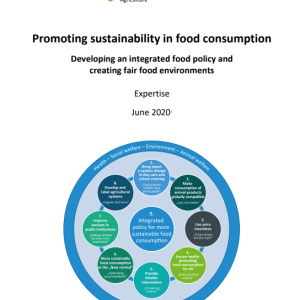
The Scientific Advisory Board on Agricultural Policy, Food and Consumer Health Protection to the German Federal Ministry of Food and Agriculture has just released an English version of a report on promoting more sustainable food consumption. The report, originally published in 2020 in German, defines policies that integrate consideration of four areas: human health, social aspects, the environment (including climate) and animal welfare. It focuses on designing food environments to support consumers in choosing healthy, sustainable diets.
The key policy recommendations of the report are illustrated in the figure below.
Image: Figure 4, Executive summary. Nine key recommendations for an integrated policy to promote sustainability in food consumption.
In more detail, the recommendations are:
- Gradually introduce free meals in schools and preschools, with the mandatory adoption of quality standards, measures to encourage social interaction at mealtimes, regulation of competing catering services such as vending machines, and stronger food education.
- Steer the consumption of animal products to be “less and better” by abolishing the reduced rate of tax on animal products, eventually introducing a sustainability tax, introducing a mandatory climate label for all foods, conducting an information campaign to raise public awareness of food’s climate impacts, minimising the effects for lower income groups of the proposed higher taxes, monitoring whether reducing animal-source food consumption leads to harmful substitution effects, and accounting for the impacts on animal welfare of climate-oriented measures in livestock production.
- Use price incentives, with support for lower income households, to shift consumption towards healthy, sustainable options, with measures including a sugary beverage tax, lower taxes on fruit, vegetables and pulses, and eventually a specific sustainability tax on all foods.
- Reducing food poverty through measures to limit the adverse effects of the proposed changes to food taxes on lower income households, the introduction of free school and preschool meals, and better monitoring of food poverty.
- Provide reliable information on food sustainability, including through developing an effective labelling policy covering health, social, environmental and animal welfare dimensions. The health aspect includes promoting the introduction of the Nutri-Score system in Germany and across the EU (note that Nutri-Score has some limitations - see our comments here) as well as promoting unprocessed foods not covered by Nutri-Score. Other measures include limiting advertising for unhealthy foods aimed at children, and supporting apps and other digital tools to promote sustainable food consumption.
- Calibrate social norms around food, for example by making smaller portions sizes standard, taxing sugary beverages and considering the introduction of a legal requirement for retailers and bakeries to donate food that is still edible.
- Offer sustainable, healthy food in public institutions such as care homes and hospitals through adopting quality standards for catering and introducing nutritional screenings to certain patient clinics.
- Support organic farming in contexts where large benefits are expected, and also support other “intermediate” forms of farming that may achieve environmental benefits relative to conventional systems but higher yields than organic systems. Consider the appropriate use of technologies such as genome editing and robotics in cases where they may offer sustainability benefits.
- Ensure that food policies integrate four dimensions of sustainability: health, social aspects, environment and animal welfare.
Read more here, download the full report, Promoting sustainability in food consumption: Developing an integrated food policy and creating fair food environments, here (link to 849 page PDF file) and read the executive summary and synthesis report here (35 page PDF link). See also the TABLE explainer What can be done to shift eating patterns in healthier, more sustainable directions?







Post a new comment »